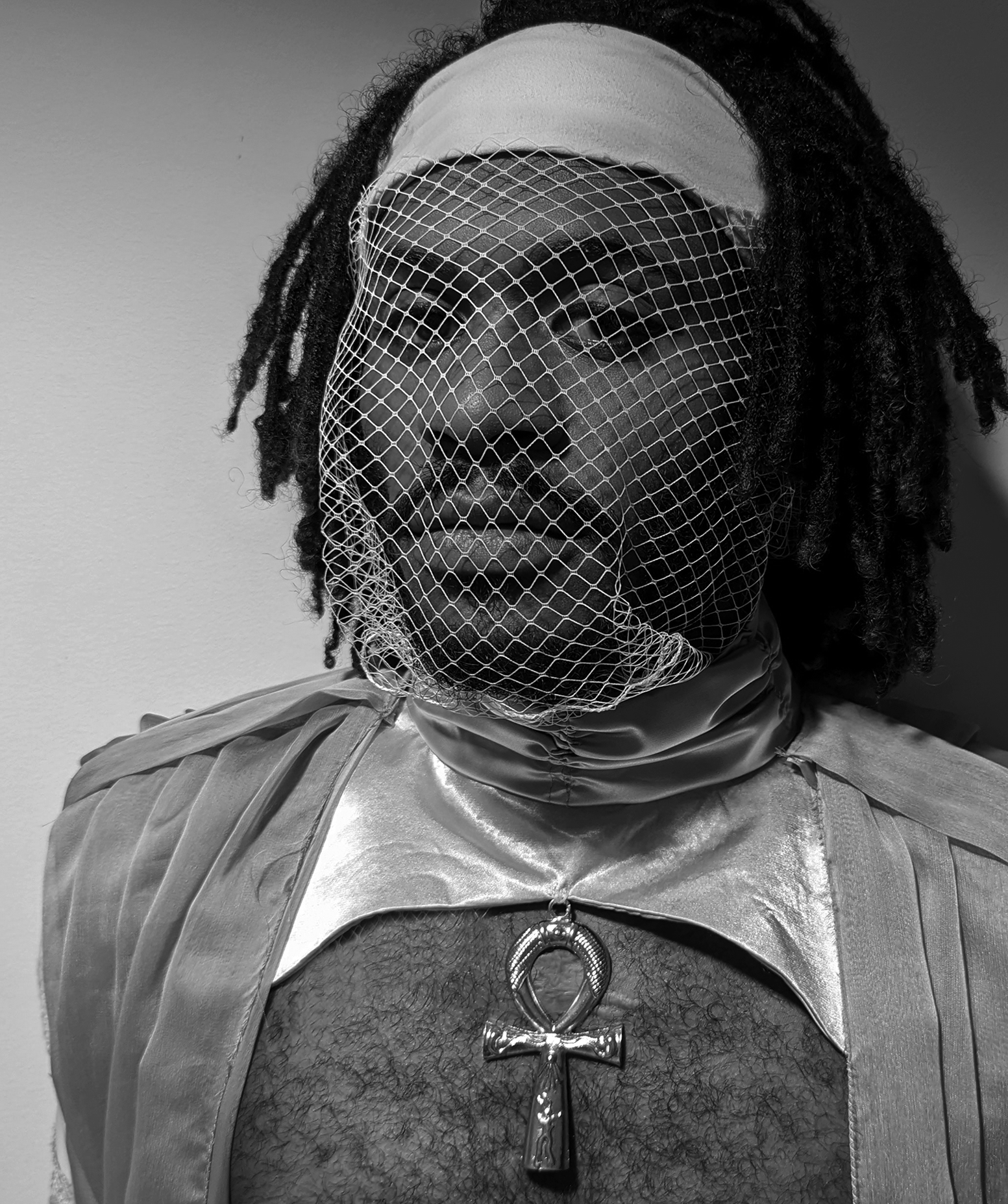Get to know the characters
THE PEOPLE OF CLEOPATRA
Here is a summary of the main characters within tonight’s interpretation of history. Most of our story is based on historical accounts and current scholarly conjecture, with some characters existing as a combination of more than one person.
Use this text as a guide to clarify the story, but please remember that emotional experience is at the heart of this production and needs no explanation.
Cleopatra (Acts 1, 2 & 3) - Madeline Bay
photo by Parker Phister
Cleopatra VII Thea Philopator, the last pharaoh of Egypt, ruled over a 3,000 year old civilization that was unrivaled in the ancient world. Her family, the Macedonian Greek Ptolemys, were installed as rulers by Alexander the Great when he conquered Egypt in 323 BC. Over the next three centuries, Cleopatra’s family intermarried immediate family members and cousins in an effort to keep the family line pure while creating a diverse city of both Greek and Egyptian communities within the bustling city of Alexandria. Cleopatra was a scientist and a scholar who was an expert on poisons and spoke 11 languages. She was the first Ptolemaic pharaoh to speak the native language of her people and was a beloved ruler. Contrary to popular belief, she was not known for her beauty, but for her brilliant intellect, wit and unrelenting dedication to her children and her country.
Sponsored by Mountaine Jonas
The Akh (Spirit) of Ptolemy XII (Act 1) - William Fowler
Cleopatra’s father, Ptolemy XII Auletes, passed away when she was 18 years old, leaving her to rule in partnership with her 10 year old brother, Ptolemy XIII. Although the Ptolemy family was infamous for both marrying and murdering their family members, Cleopatra’s father was loving towards her and saw within her the makings of a great ruler. He made certain that she was brought up with the very best education and leadership training. His passing marked the beginning of a time of great unrest and civil war.
Sponsored by Esaias Johnson & Elizabeth Cardwell
Pothinus (Act 1) - Jeff Ewing
Since Egypt’s new co-rulers were so young, their father designated the eunuch Pothinus as regent in his will. A brilliant scholar and tutor to Ptolemy XIII, Pothinus saw great power in his future. Feeling threatened by Cleopatra’s natural gift for leadership and popularity with the people, his manipulations of her siblings were at the root of the unrest in the country. He is remembered in history for the ruinous decision to murder Julius Caesar’s former ally and son-in-law Pompey the Great. Caesar had just defeated Pompey at the Battle of Pharsalus and Pothinus saw gifting his head to the new leader of Rome as a strategic move to ensure a strong bond between the two nations.
Ptolemy XIII (Act 1) - Patricio Di Stabile
A member of one of the most tumultuous families in all of history, Ptolemy XIII Theos Philopator became co-ruler with his older sister Cleopatra at the age of 10. Spoiled and easily manipulated by Pothinus, Ptolemy had his sister exiled and took sole control of the throne within two years of their father’s passing. When Julius Caesar and Cleopatra joined forces, he agreed to marry her and once again share power. This peace did not last however and his lack of loyalty brought him to an untimely end.
Arsinoe (Acts 1, 2 & 3) - Florrie Sese Geller
Cleopatra’s younger sister was 15 when her siblings ascended the throne. When Ptolemy gave in to Caesar and married Cleopatra, Arsinoe saw an opportunity, raised her own army and took over the fight, proclaiming herself pharaoh. Although she had an impressive amount of success fighting the powerful Roman army, the Egyptians negotiated with Caesar to trade her for her brother. Arsinoe was taken to Rome in chains to be paraded through the streets as part of Caesar’s victory procession, but in a surprising turn of events, the people took pity on the beautiful young princess. In one of Caesar’s characteristic acts of forgiveness that made him so popular with his people, he spared her life and sent her to live in the Temple of Artemis in Ephesus. Although far removed from Egypt and seemingly no longer a threat, Cleopatra had learned through experience not to trust any of her immediate family and took action, ordering Arsinoe’s murder which was a gross violation of the temple sanctuary, and an act that scandalized Rome.
Sponsored by Judi Maloy
Ptolemy XIV (Acts 1, 2 & 3) - Sean MacCauley
Cleopatra’s youngest brother was destined to fail. Only 8 years old when the upheaval of his father’s death was set in motion, he was relegated to the sidelines until he was needed to fill the in-name-only role of co-ruler with Cleopatra after his older brother’s death. After marrying his sister at the age of 12, he was quickly eclipsed by his newborn nephew and son of Julius Caesar, Caesarian. Again acting from past experience and in an effort to solidify Caesarian’s place as rightful heir to both Egypt and Rome, Cleopatra was forced to order an unfathomable act.
Iras and Charmian (Acts 1 & 3) - Sasha Butman and Betsy Lucas
As the closest servants to Cleopatra, some believe that these two women could have actually been advisors and had their own power within the complex that ran Egypt. They would have certainly had more respect than most, and being placed in a trusted position with such close access to the queen, and later her children, does lead us to believe that they were extremely loyal. Loyalty in this case meaning acting out whatever deeds Cleopatra deemed necessary to protect herself, her children and her country.
They were in fact at Cleopatra’s side at both of the most tragic moments of her life. First at her safe house within her mortuary temple when Antony was brought to her to die, and later when she was held hostage by Octavian in her palace. It is believed that the three women chose to die together in an act of joint suicide rather than be paraded as prisoners of war through the streets of Rome.
Julius Caesar (Acts 1 & 2) - Morgan Stillman
One of the most legendary military and political figures in history, Julius Caesar met his match in Cleopatra. Equals in both intellect and ambition, their union had obvious mutual benefits, both politically and romantically. Egypt had all the wealth and Rome all the power. Neither could fully reach their potential without the other. Caesar was enraptured by the opulence as well as the cultural and technological superiority of Alexandria. He introduced many of these advancements, like the Egyptian calendar and numerous feats of engineering to the Romans. This obsession with all things Egyptian, including its queen, caused the Roman Senate to distrust his intentions. When Julius Caesar declared himself a temporary dictator, the senators saw this act as a veiled excuse to make himself a king since Cleopatra was a queen. Even the overwhelming support and love of the citizens of Rome was not enough to save him from one of the most brutal coups in all of recorded history.
Calpurnia (Act 2) - Betsy Lucas
Caesar’s wife Calpurnia, along with the rest of Rome, knew of Caesar’s romantic relationship with Cleopatra. She was used to Caesar’s public affairs with both women and men, but was most jealous of Cleopatra’s education and independence, particularly her husband’s respect for it. Due to the constraints of a Roman woman’s place in society at that time, she was powerless to convince Caesar of the seeds of dissension sprouting all around him. On the morning of the Ides of March, Calpurnia awoke from a nightmare that foretold Caesar’s murder and refused to help him dress in the purple robes that symbolized his growing power as dictator.
Brutus (Act 2) - Cooper Verona
Rome was filled with people who both loved and hated Caesar. The senator Marcus Junius Brutus and Caesar were very close, with Caesar playing a paternal mentorship role in Brutus’ life. The atmosphere within the senate after Caesar’s return to Rome was filled with infighting, conspiracies and power plays. Brutus was under great pressure from many powerful figures who saw Caesar’s trust in Brutus as a very useful tool to achieve their goals. His treachery on the Ides of March is one of the most notorious in all of history.
Casseus (Act 2) - Jeff Ewing
Bitter from being defeated by Julius Caesar during Caesar’s Civil War, Gaius Cassius Longinus became one of the instigators of the dissension against the newly appointed dictator. Although pardoned along with Brutus in another of Caesar’s great moments of forgiveness, Casseus never got past the humiliation of defeat and became the whisper in Brutus’ ear that brought the situation to a head.
Lepidus (Acts 2 & 3) - William Fowler
An ally of Caesar’s, Senator Marcus Aemilius Lepidus, side by side with Marc Antony and Octavian, became a member of the Second Triumvirate and responsible for co-ruling Rome, expanding its borders and avenging Caesar’s death. A formidable general and politician in his own right, he has been overshadowed in history by the strong personalities of his co-rulers and was the first member to be sidelined as the partnership dissolved.
Marc Antony (Acts 2 & 3) - David Ward
Marcus Antonius was one of Rome’s most notorious figures. A brilliant soldier, but mediocre politician, Antony was a lover of battle, money, parties and women. As Caesar’s closest friend and second in command, he helped Caesar prove to the people his distaste of the idea of a monarchy at the annual Lupercalian Festival. He made a show of presenting a crown to him, which Caesar then proudly rejected. After Caesar’s murder, Antony found himself in need of funds to continue his military campaign and summoned Cleopatra to meet with him in Tarsus. Not one to be told what to do, Cleopatra waited for months, then staged one of the grandest entrances in history, arriving in Tarsus on a gargantuan boat covered in rose petals and dressed as the goddess Aphrodite. She invited him to dinner and one of the most famous romances of all time began. He went home with her to Egypt but his lengthy stay was causing him to lose all credibility and power at home. She forced him to leave in order to maintain their position in Rome, and Egypt’s position in the world. While he was in Rome and leading military campaigns, Cleopatra gave birth to twins. Once he did return, it was for good and they had another child. He declared Cleopatra and their four children, including Caesarian, rulers of most of the Mediterranean world at a celebration known as the Donations of Alexandria. This epic error in judgment was the final straw for Rome’s patience with Antony and led to disastrous results.
Octavian (Act 3) - Patricio DiStabile
A relative stranger to most of Roman society, Caesar’s 19 year old grand nephew Octavian’s designation as Caesar’s heir came as a shock, especially to Caesar’s second in command, Marc Antony, and Cleopatra, who was anticipating it to be her son Caesarian. Side by side with Marc Antony and the general Lepidus, he was now a part of the Second Triumvirate, a huge responsibility for the clever and ambitious teenager. Once the Triumvirate splintered, Antony and Octavian, soon to become the Emperor Augustus, became enemies. The ensuing war brought an end to a 3,000 year old civilization and marked the birth of the Roman Empire.














